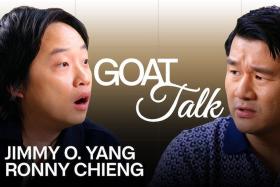OED did not invent 'Chinese Helicopter'
No, Oxford English Dictionary didn't invent this S'porean term
Look! Up in the sky.
It's a bird!
It's a Chinese helicopter!
It's 19 new Singapore English words in the Oxford English Dictionary (OED).
Actually, it's only 17 words because "lepak" and "sabo" were each counted twice as a verb and a noun.
Wait. "Sabo" can be used as a noun? Really? I think Oxford kena sabo.
Also, the inclusion of "lepaking" and "sabo king" seems rather random as "blur" is also added but not "blur king". Why so sotong?
By the way, "sotong" is another new entry but is counted only as a noun. Shouldn't it be counted as an adjective as well? Don't be such a sotong king, Oxford.
And how is "HDB" a word? It's just an abbreviation for Housing and Development Board.
Might as well include MRT (Mass Rapid Transit), CPF (Central Provident Fund) and CMI (cannot make it).
And if names of local food and beverage like "char siu", "chilli crab" and "teh tarik" can qualify to be in the dictionary, where does it end?
Is it only a matter of time before "bo bo cha cha", "McDonald's curry sauce" and Workers' Party chairman Sylvia Lim's favourite, "orh lua", all become Oxford-approved words?
By the way, remember how a few years ago, the Malaysian tourism minister claimed that chilli crab is a Malaysian dish, sparking a debate over its true origin?
In one fell swoop, Oxford pretty much settles it by defining "chilli crab" as "a dish originating in Singapore but also popular in Malaysia".
Ha! Take that, Malaysia.
Unfortunately, there's no word yet from Oxford on the origin of Hainanese chicken rice, which the Malaysian minister also claimed to be Malaysian, so that's still up in the air.
As a Hainanese person, I'm going to go out on a limb here and say the origin of Hainanese chicken rice is… Hainanese?
Food origins aside, probably the most controversial addition to the dictionary is "Chinese helicopter", which has nothing to do with China or aviation.
Oxford defines it as "a Singaporean whose schooling was conducted in Mandarin Chinese and who has limited knowledge of English".
According to the 1985 book, Army Daze, by Michael Chiang: "The story goes that a Chinese-educated recruit, when asked what school he came from, answered 'Chinese helucated', which went down in the army annals as Chinese helicopter."
BAFFLING
Yet it seems that many Singaporeans have never heard of the term. One person in an online forum accused Oxford of making it up: "Oxford invent new Singlish slang for us?"
A headline on the AsiaOne website asks: "What's a 'Chinese helicopter'? Latest Singlish entry in Oxford Dictionary has us scratching our heads."
A BBC headline says: "'Chinese helicopter': Singlish OED entry baffles Singaporeans."
I am baffled that Singaporeans are baffled by "Chinese helicopter". Maybe they didn't do national service.
Even Chinese helicopters know what "Chinese helicopter" means.
In 2005, film-maker and performer Jack Neo starred in a one-man stage show called The Last Chinese Helicopter.
He said at the time: "I look at things from the perspective of a Chinese helicopter. But some things are always the same, no matter how you look at it. If you get a traffic summons, it's still the same experience, no matter what you're educated in."
In a 2004 interview with The Straits Times, Neo's frequent collaborator, Mark Lee, was asked: "Are you really a Chinese helicopter? You were a student at Jurong Secondary School which is an English-medium school, no? So how come your English is so like that?"
Lee replied: "My first language is Hokkien and I was (in) the last batch of Chinese-educated students in the school. So really, I am really Chinese helicopter."
Wait, does this mean that Lee, 47, is among the last generation of Singaporeans to be schooled in the Chinese medium?
So no new Chinese helicopters have been produced since then?
No wonder many (younger?) Singaporeans have never heard the term.
Chinese helicopters are a dying breed.
So it's good they have now been memorialised in the Oxford English Dictionary.
At least we'll still have Ah Bengs. They will never die out.
I can't wait for "Ah Beng" to get into Oxford.
And maybe "Ah Lian" too.
Then we can all say in unison another new word in the dictionary: "Wah".
Get The New Paper on your phone with the free TNP app. Download from the Apple App Store or Google Play Store now




